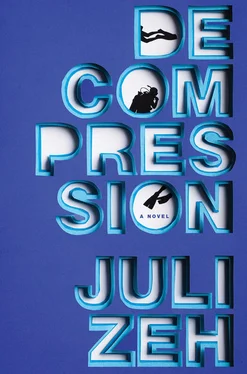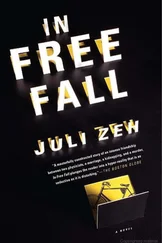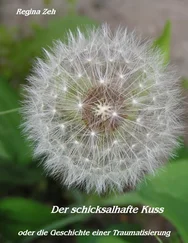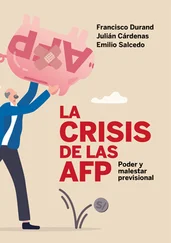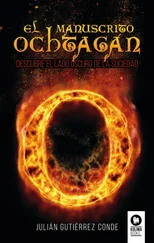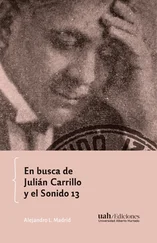That wasn’t something I thought. It was something I knew. There was no time for thinking. I’d long since switched to trimix, and in one hand I was holding the diving regulator with pure oxygen, ready to put it in Theo’s mouth. The greatest danger for both of us was the possibility that he’d come to and panic. It’s by no means unusual that drowning people kill their would-be rescuers. But I couldn’t think about self-defense, not as long as Theo and I were hanging on an anchor cable six meters underwater. It wasn’t possible to put any distance between me and the drowning man. The only reason he wasn’t still sinking was that I was still holding on to him. If he started thrashing around, he could easily rip out my own air tube. He could cling to me in a panic, damage my equipment, immobilize me. Drowning men possess superhuman strength. They’re more dangerous than any hammerhead shark.
And that was the moment when it happened. A tiny moment that showed me who I’d become in the last fourteen years.
I hesitated.
I asked myself for whom or what I was about to put my life on the line. For a man who terrorized the woman I wanted. Who would never give her up, because he considered her his property. Who had no real occupation and was of use to no one. Who missed no chance to point out that he was weary of life. I had only to release my grip. I could let Theo go and look away while he vanished silently into the lower depths. No one would ever connect me with his death.
It was only for a brief moment, but I hesitated.
Then I shoved the diving regulator between Theo’s teeth. I took pains to close his lips around the mouthpiece in such a way that the least possible amount of water could get in. I held his nose and pressed the purge button. A rush of air bubbles shot up. The pressure pumped air into Theo’s lungs. He suddenly opened his eyes very wide. He couldn’t see much in the brine. He could only sense my embrace and the cold water and the likelihood that his life was about to end. He dug his fingernails into my forearm and whirled around like a fish. As best I could, I protected my air hose from the imminent attack.
But Theo didn’t attack. In spite of the stinging seawater, he stared into my face at extremely close range. His head was shrouded in a whirl of bubbles. His lungs were pumping so hard that there was barely any distinction between his inhalations and his exhalations. The sight of him acted like a sign stimulus. We were diving instructor and diving student. My student was hooked up to my emergency air supply and hyperventilating. He was staring at me because he loved me, the way helpless nurslings love their mothers. I squeezed Theo’s forearm several times to get his attention. His eyelids fluttered. Some part of his brain made an effort to concentrate, and I nodded encouragingly, as if to say, Good. Like that . He watched as I slowly moved one hand away from my mouth: Exhale. Wait . I brought the hand back to my lips. Inhale. Slowly . I pointed to him and repeated the gesture: Exhale. Inhale . It took a little while, but eventually he joined in. His breathing slowed. We found a common rhythm. His body abruptly relaxed. He became so limp that I had to hold him more tightly. We’d done it. He allowed me to turn him around. I could hold him better from behind. From the way his back shook, I could tell he was weeping. On impulse, I gave him a hasty pat-down. The reason why he was being pulled down so inexorably into the deep was stuck in his jeans pockets: lead. Lead weights, that is, from my reserve supply. I removed the weights, and they headed for the bottom at high speed. I helped Theo take off his shoes and his jeans. The clothing also sank into the dark depths below us, but at a more leisurely rate.
After that, holding on to Theo was child’s play. I detached my substitute mask from its strap, drew it over Theo’s face, and adjusted it until it sat right. Theo tilted his head back and blew air out of his nose to expel water from the mask. Now he could see me as clearly as I could see him. He raised a hand, made the “okay” sign, and smiled. His lips were blue from cold. As I answered his sign, I felt like crying too. He might have been an asshole, but his fortitude was preternatural. He didn’t even try to ask me, in pantomime, why we weren’t going up to the surface. He’d apparently been listening to me closely during the past few days.
We spent the following thirty minutes switching back and forth between the different gases, checking our air supply again and again, and performing together some gymnastic exercises that were supposed to keep Theo from hypothermia. We did knee bends, rolled our wrists and shoulders, swam one behind the other in little circles around the anchor cable. We were connected by the air supply as though by an umbilical cord.
When my required decompression time was over and I could complete my ascent without danger, I signaled to Theo that we were going up. I took hold of him from behind again and carried him laterally a little way, until we were no longer directly under the Aberdeen . When we reached a safe distance from the boat, we slowly rose to the surface. The air tasted warm and sweet. Theo began to pant. It’s quite possible that he’d only just grasped where he was and what had happened. By all rules of logic, he should have been dead. Maybe he imagined himself in a next world that looked confusingly similar to this one.
Jola stood in the stern, waving and seething. “Fucking hell! Why didn’t you send up the deco buoys? Can you imagine how worried I’ve been?”
I wondered if she’d gone crazy, but there was no time to answer that question or any other. I gave instructions, brought Theo over to the Aberdeen ’s stern, and closed his fingers around the side rails of the boarding ladder. He didn’t have enough strength to pull himself up. I explained to Jola how she should grab hold of him and shoved up from underneath until Theo plopped on the deck like a wet sack. He’d used up his last ounce of strength and lay there like a corpse. I hurriedly removed the things I’d put on him while he was underwater — dive mask, hood, gloves. I ordered Jola to pull off his soaked shirt, and then I sent her to get some towels, a thermal blanket, and the emergency oxygen kit. She obeyed. Theo not only lay there like a corpse, he also looked like one. His skin was waxy yellow. His closed eyes were sunk deep in their sockets. His lips, hands, and feet were appallingly blue. A thin stream of blood ran out of the hair near his left ear. I felt a laceration and a great deal of swelling. While we were underwater, I hadn’t noticed the wound. I was just thinking that he shouldn’t be moved for any reason when a coughing spell caused him to rear up. I rolled him into a stable position on his side, and salt water came gushing from his mouth. Jola brought the kit. I pressed the breathing apparatus to Theo’s lips and said to her, “Drive the boat.”
“He wanted to kill himself,” she said. As if I’d asked a question that required such an answer. My mouth contorted in disgust. Suicides may stuff lead weights in their pockets, but they don’t whack themselves across the head with the big water-pump pliers usually kept in the engine room belowdecks.
“Drive!” I shouted at her. “Drive as fast as you can!”
She dithered a moment and then turned around and ran to the helm stand. The engine sprang to life. A speed of six knots had never been slower. I wrapped Theo in the blanket, gave him oxygen, massaged his limbs. When I was sure I could leave him briefly alone, I crowded next to Jola at the helm stand and made a radio call. Then, when my cell phone finally found a network, I called the hospital. They promised to send a helicopter.
The rest of the return trip seemed endless. While I knelt beside Theo, who gave no more signs of life, my mind kept returning helplessly to how normal he’d seemed underwater. Downright calm and relaxed. As if everything was fine.
Читать дальше
